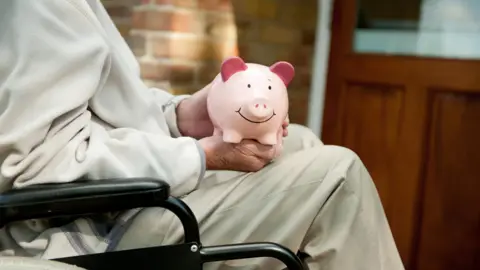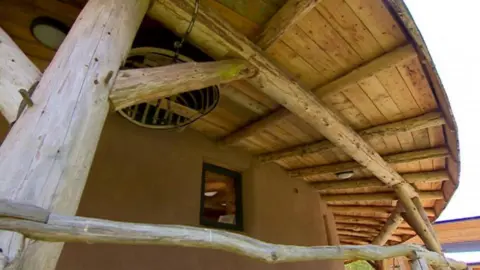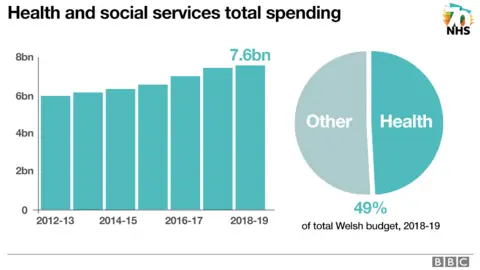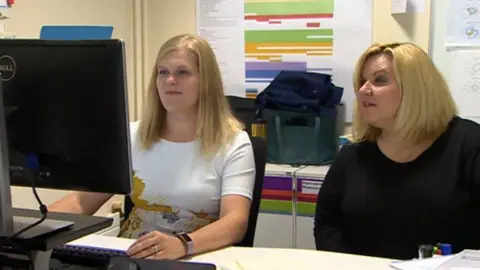NHS 70: Can we keep feeding the NHS financial beast?
 JOHNGOMEZPIX/Getty Images
JOHNGOMEZPIX/Getty ImagesWe are continually hearing about the problems facing the NHS. There is talk of crisis even. Recently there has been suggestion there could be a special tax in future in Wales to try to help it. But is it all about money?
At Down To Earth, they specialise in tackling mental health, which takes up more than 11% of the NHS Wales budget.
"If you go to a doctor you get given a prescription, which is great, for a lot of people that works but for some people nothing changes in their lives," said Jon Bayley, lead facilitator at the Swansea-based project.
"And that's the problem - what's going on in their lives is contributing to their poor mental health."
The NHS in Wales is increasingly turning to approaches like this to heal people.


Patients with brain injuries, mental health issues, stress and anxiety have been referred here for the last 10 years by the local health board, Abertawe Bro Morgannwg. They work on building projects, including developing offices and residential blocks for future visitors.
The project has been evaluated by Swansea University on its effectiveness and it is argued it is a cheaper and more effective method than antidepressants.
"It's a frightening thing to come to a new place - with people you don't know and to learn to do something you've never done before," said Mr Bayley.
"But because of the environment, people's confidence goes up so quickly. A course of Down To Earth is as effective in treating depression and anxiety as a course of medication in an eight-week period. It's cheaper because the effects last longer."

You might be interested in these stories:


The NHS Wales is a vast beast eating up more than £7.5bn including social services in the last year - nearly half of all the Welsh Government's spending.
For mental health alone, it costs £228.79 per head.
Prof Marcus Longley is a health economist who has studied NHS finances closely and has since become chairman of Cwm Taf health board in the south Wales valleys.
"Financially the story has been a bit of a mess really," he said. "For the first 10 years of this century the health service in the UK had about a 50% real terms increase in resources - huge.
"Since then, the last eight or nine years, every single year has been a real terms cut - that's not helpful, boom and bust does not help the health service plan ahead."
But the health service is treating more and more of us.
On average we make more trips to the GP (19m estimated a year in Wales), more to outpatients and our visits to hospital emergency units are now consistently above the 1m mark each year.
The health service across Wales is trying to work smarter.

At Aneurin Bevan - the Newport and Gwent valleys health board named after the NHS's founding father 70 years ago - they are working with people outside health to find better ways of operating.
Prof Sue Bale, director of innovation at the health board, said it was also about looking at getting best value and looking for new solutions.
It has already brought in two maths experts to improve how they do things - including improving workflows inside A&E departments. It has already saved £250,000 in eight months just by looking at a better system for reducing bed pressure sores.
"We need to look at how we partner with industry, what about the charities and voluntary sector and those organisations who can work together to provide new innovations for patients," said Prof Bale.
"It's very interesting what you can do with the money you've got if you do things differently. Do you put your money up front of the disease or the treatment? Or do you put the money into the treatment arm of it? It's about how you can use technologies and all the different solutions that are out there to benefit patients."
But health is closely affected by other factors like diet, poverty and levels of social care. So is working differently enough to cope with growing demand. Do we need to spend more as well?
Prof Gerald Holtham of Cardiff Metropolitan University has been examining the finances of social care in Wales and is preparing a report for the Welsh Government.
"We know that demand is going to rise - at the moment 23% of the population is over 70, by 2045 the number will be nearly 35%. That's bound to increase the demand for health and social care," he said.
"The money has to come from somewhere and it can't come from other parts of the Welsh budget. Unless the British government raises taxes and sends more money to Wales, then the Welsh Government will have to do it itself.
"It would have to persuade the public they would have to pay a levy of some sort to finance the growth of the health service and social care."
Eventually it could be an extra 2p in the pound on income tax.
The UK Government has now promised that the NHS in England will get a £20bn boost to its budget to 2023.
Health Secretary Jeremy Hunt said there would be "an increased burden of taxation" to fund the 3.4% average annual rises.
The 70th "birthday present" would include a knock-on effect of an extra £1.2bn to Wales although the Welsh Government cabinet will decide how this will be spent.
The anniversary is an opportunity to both celebrate the achievements but also to question whether the systems that we have developed over the years deliver what patients want now.
At the same time the debate about what we can afford to fund as a society is getting ever complicated. Medical and technological breakthroughs are achieving heights barely imaginable a decade ago.
For more than two decades there has been a mantra that relatively low income tax is a good thing; is that beginning to change? UK-wide surveys seem to suggest that they are.
The challenge is enormous: to adapt, embrace technology, change ways of working, enable more people to stay healthy for longer and within a budget that taxpayers are prepare to pay for.
